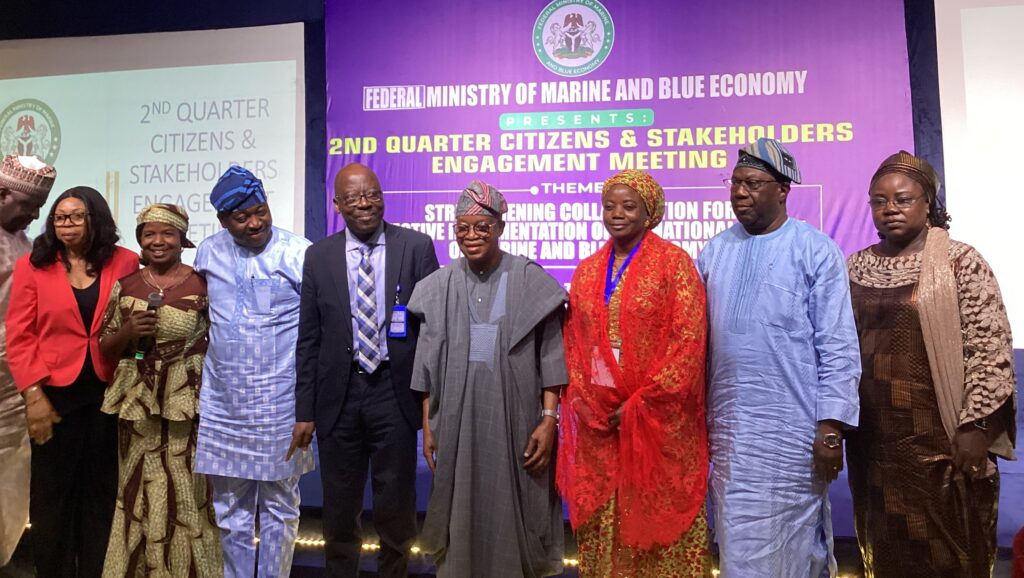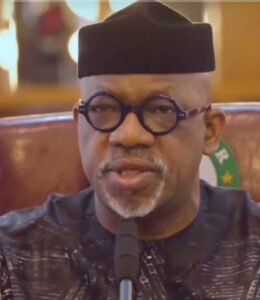Nigeria charts bold course for marine, blue economy growth as Oyetola unveils strategic roadmap

Abdullateef Fowewe
The Minister of Marine and Blue Economy, Adegboyega Oyetola, has outlined a strategic roadmap for implementation of the National Policy on Marine and Blue Economy.
Video link:
Delivering a compelling address at the Citizen/Stakeholders Forum in Eko Hotels, Victoria Island, Lagos, Oyetola underlined the significance of the newly approved National Policy on Marine and Blue Economy, describing it as “a critical turning point providing a comprehensive framework to unlock value across our marine ecosystems.”
Further speaking at the forum which brought together government officials, industry leaders, academia, and civil society to collaboratively shape Nigeria’s maritime future, the Minister highlighted the policy’s broad scope, which includes port infrastructure, maritime security, aquaculture, ocean governance, marine biotechnology, renewable energy, coastal tourism, and climate resilience.
Reflecting on the Ministry’s progress since the administration’s inception in 2023, the Minister proudly reported that “the Ministry achieved a 75% performance score at the end of 2024,” as confirmed by the Office of the Special Adviser to the President on Policy and Coordination.
This places, he noted the Ministry among the top-performing government agencies despite operational challenges.
Oyetola further established that one of the forum’s key messages was the urgent need to modernize Nigeria’s maritime infrastructure, revealing that “the Federal Government has approved the contracts for the reconstruction of the Apapa and Tin Can Ports, under the Western Port Rehabilitation Programme,” with procurement underway for Eastern Ports.
Complementing these upgrades are digital innovations like the Port Community System and a unified One-Stop-Shop for port clearance, aimed at reducing delays and boosting investor confidence.
However, the Minister outlined plans to revive a National Carrier through public-private partnerships and announced that the Nigerian Maritime Administration and Safety Agency (NIMASA) is preparing to launch the Cabotage Vessel Financing Fund to empower Nigerian shipping operators.
On security, he proudly declared that “Nigeria has maintained zero piracy incidents in its territorial waters for three consecutive years” through the Deep Blue Project, earning international commendation.
He further divulged that Nigeria is also spearheading regional cooperation by championing the establishment of the Regional Maritime Development Bank under the Maritime Organisation of West and Central Africa (MOWCA), which will finance maritime infrastructure across the region.
Domestically, the Ministry is advancing inland waterways safety and transportation, distributing over 42,000 safety jackets and deploying ferries and patrol boats to reduce accidents.
Oyetola stressed that “the transition to a sustainable blue economy model is not automatic; it requires innovation, investment, policy coherence, and human capital development.”
In closing, the Minister expressed gratitude to all stakeholders and called for continued collaboration, “Let us seize this moment with the sense of urgency and responsibility it demands.”
In her remark, Dr Odunayo Ani, President of Women’s International Shipping & Trading Association (WISTA) Nigeria, described the event as “a pivotal moment in our collective journey toward harnessing the full potential of Nigeria’s marine and blue economy.”
She praised the Federal Government’s policy as “both timely and visionary,” highlighting its focus on “sustainable ocean governance, economic diversification, job creation, and environmental stewardship.”
WISTA Nigeria commends the Ministry for creating “an inclusive platform to foster synergy among public and private sector players, civil society, and the academic community,” stressing that “strategic collaboration is not only essential but indispensable” for success.
She concluded by assuring continued support, saying, “We stand ready to support this agenda through advocacy, training, and partnership” to unlock opportunities for the nation’s prosperity and future generations.
Also speaking, the representative of the Nigerian Navy, Captain Andy Zidon, stressed the Navy’s dedication to improving maritime security noting that the effort has resulted in Nigeria being removed from the list of piracy-affected areas by international organisations.
He pointed out the Navy’s partnership with other agencies, such as the Nigerian Customs, to maintain a safe and secure maritime environment, which is vital for the Nigerian economy.
The Comptroller General of the Nigeria Customs Service, Bashir Adeniyi, underscored the agency’s dedication to strengthening maritime security and promoting sustainable resource management during a recent address.
Represented by a senior official, Adeniyi outlined key areas of focus including offshore oil transportation, offshore oil and gas exploration, and maritime training.
In his remarks, the Comptroller General stated, “Our efforts encompass enforcing maritime laws and regulations, combating maritime crimes such as smuggling and illegal fishing, and promoting transparency and compliance in maritime operations.”
He further highlighted the importance of these initiatives in supporting sustainable resource management and attracting investment to secure Nigeria’s economic growth.




